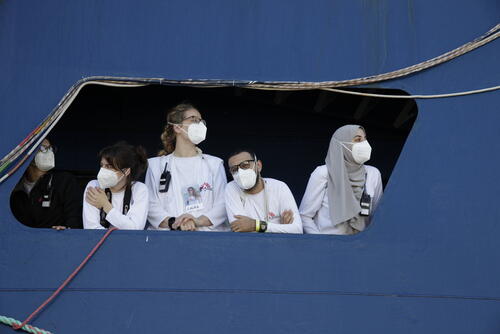International Activity Report 2021 > Confronting and addressing our responsibilities on discrimination, abuse and the environment
Médecins Sans Frontières (MSF) continues to work to ensure people across the world, in some of the most remote and excluded regions, have access to healthcare. But we must also continue to push ourselves, to self-reflect and question whether we are keeping in line with our responsibilities to the environment and on discrimination and abuse suffered at the hands of our organisation by staff, patients and communities.
In 2020, we recognised and acknowledged that, despite years of raising awareness and efforts to address issues of inequities, discrimination and institutional racism, progress had not been fast enough. This led to a public commitment to tackle discrimination and racism within our organisation.
Fulfilling this commitment was a top priority in 2021 and this resulted in a strong mobilisation at all levels of the movement. A key set of actions are organised around a shared plan divided into seven categories: staff rewards including remuneration and benefits; management of abuse and behaviour; staff recruitment and development; exposure to risk; communications and fundraising; standards of care for the patients and communities with whom we work; and executive governance and representation.
At the end of 2021 we released a progress report on these categories that aim to address diversity, equity and inclusion within MSF.
Although we have made headway, there is a long road ahead to address the complex issues that we face in terms of creating a fairer, more diverse and more inclusive organisation. We are not talking about making a few changes here and there or ticking a few boxes; we aim to make a cultural shift, changing the very essence of our organisation in terms of diversity, equity and inclusion. This takes time, but we are on the right path.
In 2021, we also continued to seriously address misbehaviour within MSF, with the unambiguous aim of eradicating abuse of all nature within our organisation. This is a complicated and multifaceted task, but an essential one. The humanitarian sector is unfortunately not immune to issues of misbehaviour and abuse. In many contexts, the presence of humanitarians is associated with new employment or business opportunities, additional funds and assets in areas of extreme vulnerability. The management of these resources represent a risk in terms of abuse, and it is our responsibility to minimise it.
We have improved identifying staff who have been found to have committed abuse over recent years, so that sanctions taken against individuals are shared between MSF entities across the world. But we are also very aware that many cases of abuse remain unreported, and more efforts are needed in making our reporting mechanisms more accessible. This is particularly true for our locally hired staff, people we treat, and local communities who very rarely use these mechanisms.
This issue was illustrated very clearly in eastern Democratic Republic of Congo, where investigations by journalists and other organisations have reported widescale abuse – including exchanges of sex for work – committed by humanitarian workers during the response to the 2018-2020 Ebola epidemic. After receiving information that some MSF staff may have been implicated, we launched an investigation into specific cases. We also undertook a broad review to understand staff perception of abuse issues and our ability to address them. The fact that cases did not emerge from MSF’s own reporting mechanisms is a confirmation that they need to be more trusted and available, especially during acute emergencies.
We know that the people we support, in some of the most vulnerable areas of the world, are disproportionately affected by the climate crisis. We see the consequences of extreme climate events first-hand: last year, thousands of people fled their homes in Mozambique due to increasingly destructive cyclones; hurricanes in Haiti and the Philippines destroyed entire cities and towns; and floods in South Sudan left nearly one million people internally displaced.
2021 also marked a more concrete definition of how to implement MSF’s 2020 Environmental Pact, which recognised the need to make real and immediate changes in order to help curb the health impacts of climate change.
Recognising our own contribution to the global problem of carbon emissions and human-caused environmental disruption, we have pledged to reduce our emissions by at least 50 per cent, compared to 2019 levels, by 2030. Decarbonising our organisation is an extremely demanding endeavour, as responding to humanitarian and health crises around the world – last year we worked across more than 70 countries – is inevitably carbon intensive.
Assessments to establish MSF’s 2019 carbon footprint are underway, and different parts of the MSF movement will strive to reach that target in a variety of ways. For example, we already know that drastic adaptation will be needed when it comes to transporting people and supplies, construction, energy and waste management.
Delivering rapid assistance to people in some of the world’s most remote places will always remain our priority, but we are determined to continue doing this in a way that does not contribute to causing harm to the very people we are trying to help. This may result in radical changes to the way we do things, but it is a moral, humanitarian and health imperative.



